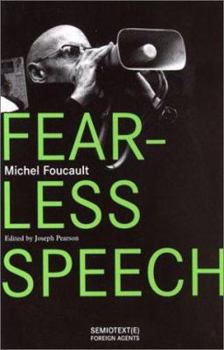Book Overview
This volume collects a series of lectures given by the renowned French thinker Michel Foucault late in his career. The book is composed of two parts: a talk, Parrēsia, delivered at the University... This description may be from another edition of this product.
Format:Paperback
Language:English
ISBN:1584350113
ISBN13:9781584350118
Release Date:February 2001
Publisher:Semiotext(e)
Length:183 Pages
Weight:0.35 lbs.
Dimensions:0.5" x 4.5" x 6.9"
Customer Reviews
1 rating
An inspiring read that deserves more attention
Published by Thriftbooks.com User , 22 years ago
This compact volume makes a good read and a great gift to any thinking person. A series of transcribed lectures, Fearless Speech introduces the notion of parrhesia - roughly "telling of the unvarnished truth" - as it has developed from Greek thought onwards. Foucault, acting here as the master historian of ideas, is precise and erudite, his language is clear, and his story inspires. The discussion begins with the origins of the word in early Greek thought and its use by Euripides in tragedy, and then moves on to discuss the place of parrhesia in democratic institutions, and ultimately its practices and its games. Parrhesia is a type of speech that is neither rhetoric nor dialectic, though it has historically occupied an important space among both - forming perhaps a trialectic. Parrhesia is a species of truth that mandates its own telling, in a quasi-spiritual fashion if need be: the parrhesiastes, or truth-teller, is one who puts him- or herself at considerable risk, including the risk of death, with his or her words. It can easily be seen that parrhesia is an essential antecedent to criticism and critical theory, but it is also ubiquitous in many forms of discourse. The Jeremiads of prophetic speech, the jokes of court jesters, Che's formative travelogues around South America, Taussig's defacing messages to the academy, and the best-selling literature of Rushdie that was in the 1990s so ill-received by the Muslim community - all of these are examples of this powerful discourse-form at work and play.I first ran across the term in Arpad Szakolczai's excellent volume on Weber and Foucault, "Parallel Life-Works." After reading FS, I was frankly amazed that the idea is not more widely discussed in university rhetoric classes. The concept is extremely fruitful, first of all, for anyone interested in rhetoric, dialectic, philosophy, and law. Moreover, for anyone studying Foucault's life or epistemic universe (orders of discourse, manifestation, dispositifs, and so on), parrhesia needs to be on the list of terms. For those interested in neo-Enlightenment thinkiers like Habermas and the communicative ethics thinkers like Benhabib and Miller, Rorty and the pragmatists, or the large and diverse group of scholars studying ideology (such as Teun van Dijk) within Critical Discouse Analysis, it's also a very worthwhile read. Most of all, though, the book shows everyone - and not just the intellectual - that parrhesia needs to be incorporated within our everyday modes of thinking and speaking. To what extent are "we" speaking, and to what extent is ideology speaking through us? What power does our speech reproduce, and what might it transform? Is our speech emancipatory? Does it contribute to the complexity of thought? Does it leave more questions open than closed? Do we break new ground, or just re-hash the useless play of words? This is a book that will fuel the mind and inspire questions like these like few others I've recently read. If y





